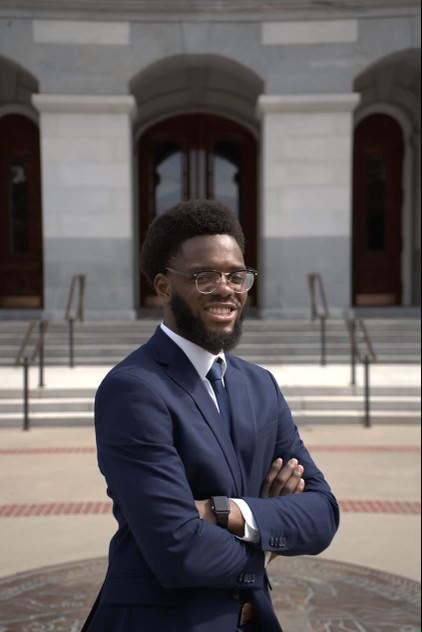Ilupeju ran unopposed and was elected ASUCD President during the spring 2024 election
By VINCE BASADA — campus@theaggie.org
Gaius Ilupeju, the two-time ASUCD Senator and current underrepresented students officer for the UC Student Association, ran unopposed and was elected ASUCD President during the spring 2024 election. The third-year political science, public service major ran on the Forward slate alongside Aaminah Mohammad as ASUCD Internal Vice President. They campaigned on an expansive platform of student advocacy which includes, among other priorities, the establishment of a tenant union, providing resources to student workers to unionize, expanding equitable access to parking and bringing back Tipsy Taxi. Set to take office in the coming months, Ilupeju sat down with The California Aggie to talk about his campaign, his priorities and his hopes for the upcoming term.
Below is a transcript of Ilupeju’s interview with The Aggie that has been edited for length and clarity.
Q: How are you feeling now that the election results are out?
Ilupeju: I’m feeling great. I’m really excited to get to work with everyone [who] was just elected and to represent the student body to the best of my ability. I think that there’s a lot that we can accomplish in this next year, and I am really excited to do all that.
Q: Why did you run for ASUCD President? What motivated you?
Ilupeju: I ran for president because I was really unhappy with the current state of affairs. I’ve been there for the past three years, and we continue to face the same issues frequently. I just felt like, with the experience I had, I really needed to assert myself and put myself in the position of higher leadership to direct ASUCD where I think it needs to be headed. I think that this association has historically done plenty of amazing things for students, ranging from providing entertainment, fostering community [and] ensuring that university administrators make student-centric decisions. It’s really telling, when you look at this campus, how much ASUCD has contributed to every facet of student life and just improved the quality of living for students every decade. To me, it’s really difficult to see an organization that’s capable of so much doing so little in the past several years, especially in the areas that students care about.
Q: Could you talk a little bit about your past with ASUCD, working in student government and your time as a senator?
Ilupeju: I served two terms as a senator, and that started my freshman year. It’s the longest that any person has served as an elected member of ASUCD since the adoption of a new constitution in 1995. In both terms, I was mainly focused on improving our engagement with marginalized communities and increasing the amount of basic needs services we provide. In my first term, I really championed pushing out a basic needs survey to determine where we could set up satellite pantries in other areas of campus. That same year, we were battling [COVID-19], and there was a resurgence in January. I worked with that Senate table to facilitate conversations with administration, primarily by sending out letters to make sure that students got an extension on virtual learning. During my second term, I was realizing that we provide so many services for students, but because our outreach and engagement with them is pretty bad, […] a lot of [them] go unused. At the end of the day, it’s just a misuse of student fees if you aren’t able to provide necessary services [and] make sure that they’re accessible and visible. Once I termed out, I became more focused on my role in the UC Student Association, where I serve as the underrepresented students officer. I tried my best to learn all the ways that relationships [between students and administrators] could be used to produce positive outcomes for students here on the UC Davis campus.
Q: Have you started to think about how you want to improve ASUCD outreach and how you want to engage with students next year during your tenure?
Ilupeju: I think that we have to take steps to improve our general marketing, communications and marketing strategy. We’ve already started that by hiring a new creative director who is going to work on marketing full time, and I’m excited to work with him. Also, changing how elected officials interface [with the] student body and kind of report on what we’re doing. We need to do more, and we need to hold more events that are visible to ensure that we’re really reaching as many people as we can. We need to improve the way we interact with other student organizations, so they know that they can receive financial and logistical support from ASUCD. That comes with introducing a new culture here where people keep engagement and outreach at the forefront of everything we do. I also think that it means setting up future student leaders for success. Finding ways to explain how we make use of student fees better so we can regain student trust is paramount, because we have a lot of money at our disposal, and it all comes from student fees. We don’t do a great job of explaining how we use it or how we intend to use it once students graduate. We’re doing all these amazing projects, some of them that won’t be finished until students are out of here. I think that if [they] were aware of how we were spending their money, they would really be happy with some of these investments we’ve made.
Q: You ran with the Forward slate, and a lot of your platforms and campaign promises focused toward advocacy for students. They include: creating a tenant’s union, expanding satellite pantry locations and looking into having free laundry for first-years, among other things. Could you talk about how you and the rest of the slate came together to focus on what you wanted to do next year?
Ilupeju: I would say the foundation of everything that we decided to run on was conversations with our peers, particularly student leaders. A lot of these student leaders represent communities who talk about certain issues like improving housing: something that’s on everyone’s mind. Access to basic needs is something that people care about. So it was really having discussions between ourselves to see what was possible through ASUCD and also what students care about. I think it’s a mixture of these two that created the platforms we decided to run on.
Q: Do you think that during your year-long tenure you will realistically be able to implement or start all of these projects?
Ilupeju: Right now, we’re in discussion about when we would want some of these things to be accomplished. We know that our platforms are a bit ambitious, and sometimes you plan as best as you can but unexpected things happen, and the university works notoriously slow. So we, first of all, plan on hiring a lot of student workers and volunteers to help make this happen, but we’re also prioritizing the things we think […] are most important. We know that some of these things take multiple years, and so we’re very much fine with setting up future student leaders to follow up with some of these goals, but making sure that we’ve at least attempted to initiate them during the academic year.
Q: How do you feel about the current presidential administration under Francisco Ojeda? It’s been marked by impeachments and a lot of notable, if controversial, developments. As the year is coming to a close, have you been able to reflect on his time in office?
Ilupeju: I feel like the Ojeda Administration faced a lot of troubles because a lot of different difficulties converged to produce an overall unsatisfactory year for a lot of people, including the executive office. I have no doubt that they genuinely wanted to provide strong leadership and advocate for students to the best of their abilities. But I do think that a lot of different events happened, a lot of them unforeseen, [which] led to an overall unsatisfactory year for many students. I think that the best that we can do after their tenure is to look critically at all the things that went wrong and work as best as we can to prevent them and ensure that this never happens again and [that] we don’t repeat some of the mistakes that were made.
Q: What do you want our readers, the voters of ASUCD and the student population as a whole to know about you and your platform moving forward? Is there something that you think they should know about next year?
Ilupeju: They should know that fixing the issues on this campus and making sure that everyone’s voice is heard is a mission that we all have to commit ourselves to. That includes people within and outside ASUCD. Unless we build a sense of community and foster a culture of accountability, none of the things that we all want will happen at all. I want the readers to know that community oriented advocacy truly is the way forward for us all.
Written by: Vince Basada — campus@theaggie.org




